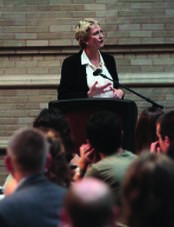
President Jill Tiefenthaler speaks to the audience in Denver.
The Learning Adventure
Colorado College attracts a certain type of learner: one who sees higher education as an adventure, one who takes pride in being independent and free-spirited, and one who is up to the challenge of the Block Plan. This is just one of the insights I gained during my conversations with students, faculty, and staff on campus and over the course of visiting alumni and parents in Colorado Springs, Boulder, Denver, Boston, Minneapolis, Chicago, Los Angeles, Seattle, Portland, San Francisco, Washington, D.C., Greenwich, Conn., and New York City. I was interested in learning more about how we are distinctive from other colleges in the U.S., as well as identifying areas for improvement and ideas that should guide us as we offer an outstanding liberal arts education to future generations of students. After analyzing the responses — more than 2,000 comments in all — we have identified some common themes that will inform our planning work in the year ahead.
Pillars of Strength
Across our conversations, five themes emerged that reflect a consensus on what makes Colorado College the outstanding institution it is.
First, our students are our greatest asset. They arrive here in search of a learning experience that they know will be as unique as it is rigorous. Once they are here, their personal and intellectual explorations propel the college forward and renew the bold determination of our community. “We have an insanely interesting and empowered student body and wonderful opportunities to inspire that,” said a Denver grad.
Throughout my talks with faculty and staff I heard how our amazing students contribute to our learning environment in fluid and creative ways. Faculty and staff welcome and appreciate the diversity the student body represents and value their connections with students. According to one faculty member, “our students have an adventurous spirit, a willingness to try anything and a serious engagement with art that is bigger than any of us.” My talks on campus suggest that other faculty and members of the staff agree.
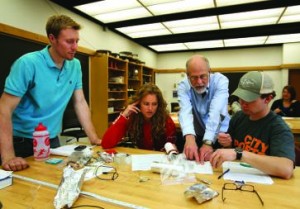
According to feedback received during the Year of Listening, professors’ availability and support for students both academically and personally make Colorado College special. In this photo, Prof. Shane Burns works with physics students.
Second, our faculty and staff make a lasting impact on our students and alumni. One student said,“the time and energy faculty give to students demonstrates how much they value us. Professors’ availability and support for students both academically and personally make Colorado College special. In the words of a Boston grad, “The continued passion from teachers for their students had the biggest impact in my CC experiences, and it is what I hope will have the biggest impact on incoming freshmen.”
Other graduates recalled the attention they got from faculty, one acknowledging that he “met some mentors who changed my life” [Online]. Many would wholeheartedly agree with the current student who said, “Much of what I have learned from professors at Colorado College has been through example. The professors’ high standards of academic passion, intellectual engagement, and professional integrity, while expecting the same from students, have shaped me as a scholar and a person.”
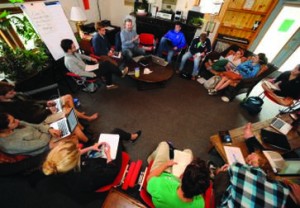
The Block Plan provides faculty and students with unique flexibility and expansive opportunities for learning. Here, Dennis McEnnerney, adjunct associate professor of philosophy, has a class discussion with students at the Baca campus.
Third, we saw overwhelming support for the Block Plan, the hallmark of our educational experience. As our students and graduates know, the Block Plan provides faculty and students with unique flexibility and expansive opportunities for learning. As one grad recalled: “The Block Plan offers an incredible experience with a superior education that sets us apart. The opportunities to gain specialized knowledge and study abroad on the Block Plan are amazing” [Online]. More specifically, I learned that the Block Plan increases our capacity to emphasize undergraduate research and the role of faculty scholars as mentors to students; promote reading, writing, and analytical skills; sustain our investment in the arts; increase our focus on experiential education; and incorporate digital learning across the curriculum. It is clear that this bold experiment has developed into a powerful strength.
Fourth, our constituencies share a clear understanding of the intrinsic value of a residential liberal arts education. This was quite refreshing considering the increase in calls around the country for emphasis on vocational education, certificate training programs, and online education. Rather than moving in these directions, members of our community ask that we continue to provide a liberal arts education. “Don’t become an institution that trains students for jobs. Help them to become critical thinkers, excellent writers, innovative problem solvers,” said one graduate from Minneapolis. Another graduate asked that CC continue to “stretch our students, faculty, and staff to learn more, give more back, and deepen our abilities to live well in (and change) the world”.
I also learned how the residential experience enriches what students learn in class. Opportunities to lead through clubs and other organizations, engage and collaborate with others in the arts, and build relationships with peers through thick and thin strengthen the overall liberal arts education. In addition, our outstanding athletic programs enrich the campus experience by allowing students to learn more about teamwork and healthy competition by offering a choice of 17 varsity sports, including Division I men’s ice hockey and women’s soccer, an array of club sports, and a dynamic intramural program.
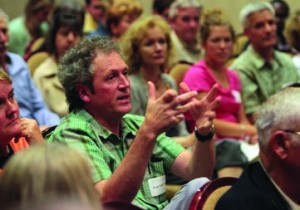
Scott Allen '87 participates in the Boston event.
Fifth, and without question, we are located in one of the most beautiful places in the country, if not the world. The mountains, canyonlands, and sand dunes of the Southwest provide a stunning environment in which to immerse oneself in nature and to reflect on our shared sense of stewardship over resources. One Denver grad noted that we have the combination of “top-notch academics taught in an adventurous way in a beautiful unique setting.” Some may describe our location as remote given that we are the only private liberal arts college in the Rockies, but time after time we gain clear strategic advantage with our unique setting in the mountains and our adventurous spirit. “What attracted me and my daughter was the concept of going on an adventure,” said a New York parent.
Your Ideas for Improving
Along with the beauty of our natural setting, our environment must also be welcoming and inclusive to all students, faculty, and staff to ensure our academic excellence. Throughout our conversations, people talked about the need to increase campus diversity in its many forms. Many rightly pointed out that a multiplicity of backgrounds, perspectives, and opinions are critical to a first-rate liberal arts education. We should be creating “global thinkers,” said a Boston grad, referring to students who hone skills such as multidisciplinary collaboration and teamwork, as well as mastery of new technologies, to be prepared for a rapidly changing global context. Representing a diversity of backgrounds and opinions, faculty should teach from their experiences as well as their scholarship, helping students to appreciate different perspectives at the same time as they incorporate new ideas and approaches.
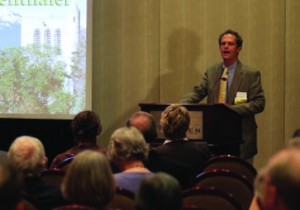
Former trustee Jack Pottle Jr. ’77 introduces President Tiefenthaler at the Boulder event.
In addition to recruiting students, faculty, and staff from a broader base, many suggested that we find ways to make the college accessible to individuals from a wider range of backgrounds, enroll more first-generation students, and clearly articulate the values of the Block Plan to a broader audience. We should preserve our flexible approach to admissions and do even more to strengthen our capacity to use financial aid to help our students and keep our student profile strong. This commitment involves a larger responsibility to ethical thinking and accountability that marks all we do.
Individuals also recommended enhancing the Block Plan so that it provides more flexibility and engages students even more fully. Faculty suggested better structures to support cross-disciplinary learning and “stringing or combining blocks to allow for deeper learning across blocks.” Other ideas from faculty related to bringing in distinguished scholars or experts to teach blocks, more opportunities for team teaching and interdisciplinary teaching programs, programs to support innovative teaching, and more interaction with the local community and overseas (for example, teaching in the community and establishing a sister institution in locations where significant numbers of alumni live).
Students and alumni discussed ideas related to a liberal arts education and ways to bridge the gap between the campus experience and future careers. A grad noted, “There needs to be a common sense and practical bent, along with superior problem-solving skills that serve better in the outside world than necessarily in the classroom. This is how we adapt to the changing world” [Online].
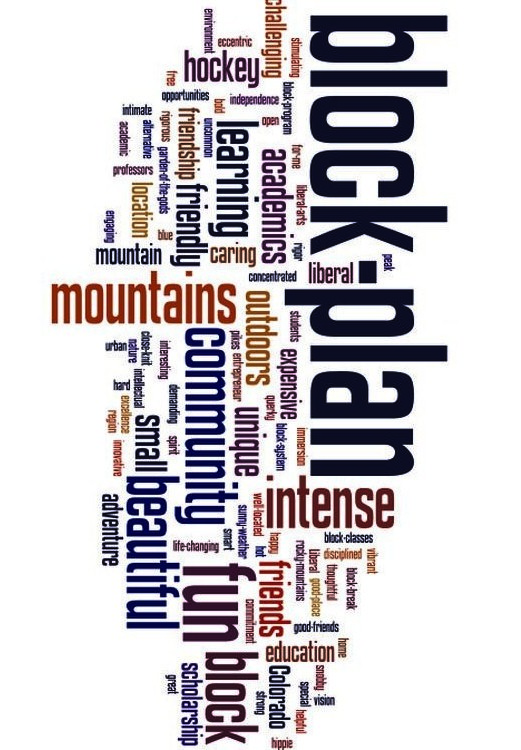
A “word cloud” illustrating participants’ input at the Minneapolis visit.
Many respondents expressed the need for more attention to essential life skills and liberal arts values as critical components of career development. “Providing strong guidance on career skills and professionalism doesn’t need to be a casualty of a liberal arts education,” said one grad [New York]. To align the liberal arts more closely with careers, students should be able to connect research experiences to career opportunities and network routinely with other alumni. This approach would not only help our students develop professional associations, but also prepare them as alumni for eventual transitions to new career opportunities. In addition, career counseling services could help students “bridge the gap between education, career and service” [Washington, D.C.] and develop “lifetimes” of meaningful work. It was gratifying to see so many of you talk passionately about the need for our graduates to think about their life’s work as a matter of principle and ethical engagement.
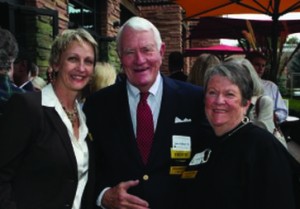
President Jill Tiefenthaler with trusteee Van Skilling ’55 and B.J. Skilling ’58 in Boulder.
Seeking closer connections in the community was another frequently heard suggestion. Just as technology is breaking down traditional barriers and allowing greater access to a range of information and services, some suggested that we encourage more linkages to Colorado Springs and our surrounding communities through increased opportunities for service and alliances with local businesses, community organizations, and schools. For example, a Portland grad encouraged us to “create a strong network of smart, easy going people who provide support for each other.” Another grad told us to “identify, design, and implement (and empower) the tools and talents necessary to engage our entire CC community for student success and community enlightenment.”
We also heard a great deal about the need for the college to become more visible and well known — in fact, some alumni stressed the importance of being known on a global scale. Ideas that came forward during our visits ranged from encouraging faculty to build local connections through academic programs to bringing great artists from around the world and involving them in the community. Many agree that we should “bring the community to the college” while “letting the world know of our stellar ways of teaching and learning” [Colorado Springs].
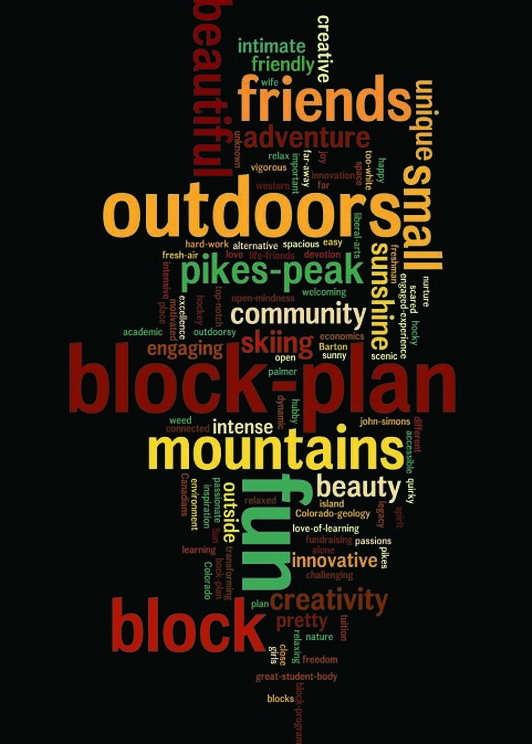
Words contributed by participants at the Boston visit.
Opportunities and Challenges for Higher Education in the U.S.
As we consider the important insights gained from the Year of Listening, we also need to think about some opportunities and challenges influencing higher education across the country — and the liberal arts sector in particular. This is a tumultuous time in higher education for a number of reasons. Despite some improvements to the economy, institutions and families are still affected by the 2008 financial crisis. A “new normal” has kicked in as individuals and institutions realize that success in the years ahead requires a strong foundation as well as nimbleness and adaptability in facing change. Colorado College is fortunate to have such strengths as we address two important questions: How do we capitalize on our traditional strengths to become an even stronger institution in this time of change? How do we extend our reach and relevance in today’s world?
By embracing change, we protect our core values and keep them relevant in the world. The distinctively American undergraduate residential experience is viewed the world over as the best preparation for young men and women to become well-rounded — and well-grounded — leaders. A recent national study by the Annapolis Group (a consortium of 130 leading residential liberal arts institutions including Colorado College) finds that alumni of residential liberal arts colleges feel they are better prepared than alumni of private or public universities for their first job, post-graduate studies, and a satisfying career in a rapidly changing world. Liberal arts college graduates also are more likely to rate their college as highly effective at helping them learn to write and speak effectively, and are more likely to graduate in four years or less than graduates of both private and public universities. The study supports my belief that a liberal arts education grounded in the residential experience educates the whole person and prepares students to excel in a range of careers and, even more importantly, live a life rich with meaning and purpose.
To thrive in this new climate of change we must manage the challenges facing all institutions today. Competition is increasing for the world’s top students, who represent a more diverse group than ever before. Rising tuition and concerns over affordability are driving a national conversation about higher education. Other pressing issues involve globalization, such as managing international enrollment and offering excellent study-abroad experiences, and the need to adapt to new technologies in and out of class, including distance learning, with a special focus on the learning styles of today’s generation of students.
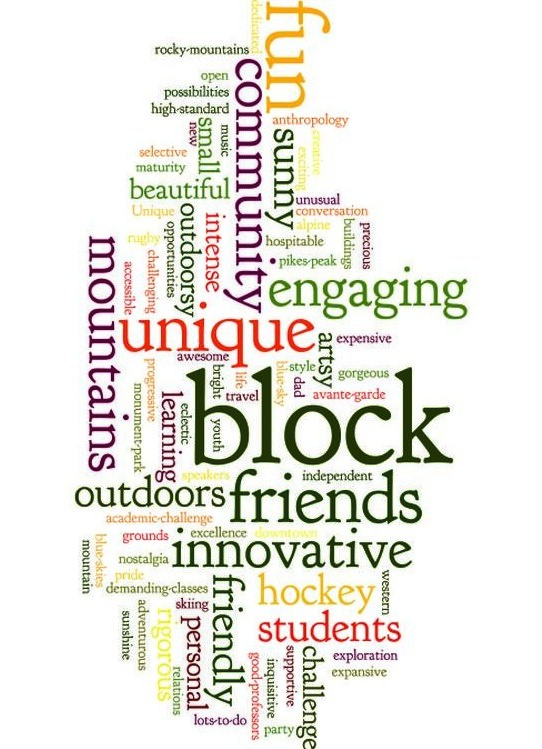
Input from Portland, Ore. participants.
Three Strategies for the Future
Informed by our conversations and research during the Year of Listening, three promising strategies are taking shape to guide our next stage of development. Increasing our focus on engaged teaching and learning, and emphasizing our distinctive place in the world both offer great advantages in terms of building on current strengths. The third strategy — extending our reach — will develop a powerful new asset for the years ahead.
Engaged Teaching and Learning
Building on the strengths of our remarkable curriculum and Block Plan, we aim to take further steps to support engaged teaching and learning during our next phase of development. In this era of increased internationalization, changing demographics of students, and new forms of learning approaches made possible by technological innovations, we realize that a flexible, nimble approach to planning allows us to keep abreast of changes and offer a rich, dynamic learning experience. The following questions are designed to guide our conversations about this goal and our future investment in this defining value.
-
How can we make the most of all the time our students spend with us?
-
What are the next steps as our faculty continue to move from oracle to mentor in the classroom and lab?
-
How can we do more to support faculty and students as they pursue scholarship and research?
-
Considering our aspirations for engaged teaching, participatory learning, and more collaborative scholarship, what forms of technology should we acquire and support?
-
How can we help students and faculty do more to expand the lesson of the liberal arts to life questions and career development?
-
What do these changes mean for the physical campus?
A Distinctive Place of Learning
Over the years, I have talked with many liberal arts college graduates — doctors, teachers, lawyers, artists, those in business and finance — and what they say confirms my own personal experience. Some of the best memories, some of the most influential impressions, come from a close relationship with a faculty or staff mentor or an illuminating experience in a seminar, study group, summer research, or study abroad program. These special moments of engaging in an intellectual community, living the life of the mind while in college, can change one’s life.
As the British philosopher Michael Oakeshott told a crowd on the occasion of Colorado College’s centennial in 1974, “Each of us is born in a corner of the earth and at a particular moment in historic time, lapped round with locality. But school and university are places apart where a declared learner is emancipated from the limitations of his local circumstances and from wants he may happen to have acquired, and is moved by intimations of what he has never yet dreamed.”
While the virtual community is capturing headlines and tweets these days, these “places apart” are found in a physical environment enriched by face-to-face interaction and by our shared responsibility to sustain that environment into the future. It’s very likely that this sense of place will become even more important to the next generation of students as they balance their virtual mobility with a deeper, more enduring awareness of physical space and their place in that space. Given that, we are fortunate indeed to have this locus of learning with its natural beauty and strong community. We gain immeasurably because Colorado College inspires a sense of shared adventure and individual entrepreneurial spirit, a ruggedness combined with a reflective culture.
-
As our students represent more diversity and their lives revolve more around social media, how can the residential experience help them develop and maintain relationships, and live out the core values of the college?
-
How can we benefit from our location in the Southwest as we offer one of the country’s premier liberal arts experiences?
-
As we become even more aware of the need to sustain the health of our physical environment, how can we use the undergraduate experience to instill life-long habits of environmental conservation and stewardship?
-
How can we do even more to protect the physical resources that will sustain the college in the future?
-
How can we increase our presence as a critical strategic element of Colorado Springs?
-
How can our alumni be more active and engaged?
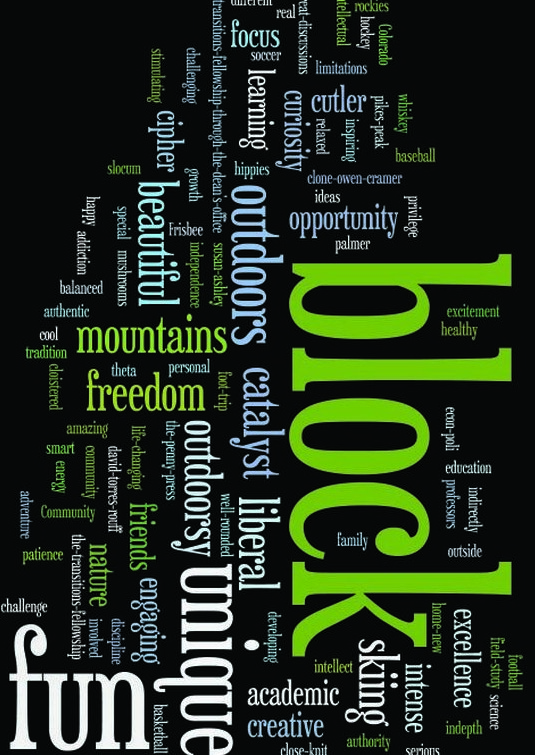
San Francisco participants’ take on CC.
Extending our Reach
Our alumni often ask how we can become more visible and better known for the high quality of our educational experience. We can extend our reach and reputation beyond our immediate area by highlighting ways that we contribute to the world of knowledge and the broader society. For example, we can begin by building on two of our current strengths — the Block Plan and our place as the liberal arts destination in the Southwest.
Several people have suggested that we leverage the Block Plan to create an institute on pedagogy that focuses on the engaged learner idea and experiential education, designing programs that become a model in higher education. Others have recommended that we draw more attention to our intellectual community by hosting more research activities, conferences, and institutes that focus on the Southwest. Our area also hosts some of the world’s premier sports organizations as well as five military installations, providing a range of opportunities for partnerships.
- How can we be better known for what we do?
- How can our entrepreneurial spirit extend our reach?
- Should we consider establishing a physical location in another part of the U.S. or the world?
Building Blocks and Next Steps
As we move from the Year of Listening to more focused work on our strategic plan, we expect creativity and flexibility to be at the heart of the “new normal” that defines the college. By finding new ways to capitalize on our strengths, particularly the Block Plan and our unique place, we will attract top students from around the world who seek an engaging liberal arts experience with a distinctive Southwest flavor. We have the advantage of appealing to individuals who are looking for a bit of adventure as part of their academic pursuits — who want to pursue living and learning on equal terms. Once they are here, we will help them prepare to be lifelong learners and leaders in the global community.
To shape this adventure, we will use new technologies and opportunities outside the classroom, whether integrating academics with on-site work at a local nonprofit organization or with experiences at a remote village on the other side of the world. As we expand our reach and reputation, we will call on our alumni to serve as mentors and role models for students and to help ensure that the college has the resources it needs to support students and faculty in their quest for knowledge and service.
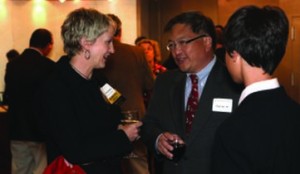
President Jill Tiefenthaler speaks to alumnus Paul Liu ’81 in Boston.
Recently the Board of Trustees expanded its service to the college by targeting a few projects with high strategic significance. Small teams of board members and in some cases faculty and staff are leading this effort. These teams are designed to work intensively for a short time (usually six months to a year), increase their knowledge of the topic as part of their charge, and give specific advice on the questions under consideration. For example, one team has recommended a process to follow for the upcoming strategic planning. Based on their ideas and input from faculty, staff, and student leaders, we will form three planning groups to engage many community members — including faculty, students, staff, and alumni — in exploring questions like the ones posed above and recommending ways to move forward. We will then integrate the work of these groups to propose a strategic plan.
See more about the strategic plan at the President’s Office Website.
See more photos and video from the individual Year of Listening events.
One Response to The Year of Listening
My August Bulletin has sat in a pile of reading for a couple of weeks. Each time I glimpsed it, I ran my eye down the colorful array of words on the cover. The more I glanced at the words, the more I wondered what a person might think they described if they didn’t know the context. Few, I fear, would would guess a liberal arts college.
Finally I decided to list the most prominent words to see if I was missing something. Here they are from largest to medium large: block, friends, fun, engaging, innovative,mountains, community, hockey, students, friendly, small, intense, outdoorsy, personal, learning, rigorous, challenge. It wouldn’t be hard to understand why others might think these words described some kind hockey training camp or perhaps a fun, private secondary school located in the mountains.
From reading the synthesis and President Tiefenthaler’s three promising strategies, I am somewhat reassured that the college is setting itself on a relevant future course, but I would hope the next “year of learning” produces a more targeted and meaningful list of words that include bold face words such as global thinkers, collaboration, teamwork, cross-diciipinary learning, rigor, liberal arts, academic excellence, Coursera, edX, distance education, problem solving, listening and conflict-mitigation skills. I also would hope to see a more precise word than “engaged” to describe CC’s teaching and learning strategy.
Having said this I appreciate that the president took the time and effort to solicit the views of Colorado College’s alumnae and am eager for her to succeed as she leads the college in a difficult and challenging time.
Sincerely,
Traer Sunley
Class of ’64
Comments are closed.